|
Need help fixing or installing a lock? We welcome questions from the public here! Sorry, no automotive questions, please.
Forum rules
WE DO NOT ANSWER QUESTIONS ABOUT AUTOMOTIVE OR MOTORCYCLE LOCKS OR IGNITIONS ON THIS FORUM. THIS INCLUDES QUESTIONS ABOUT PICKING, PROGRAMMING, OR TAKING APART DOOR OR IGNITION LOCKS,
 by jeffmoss26 » 12 Aug 2013 9:27 by jeffmoss26 » 12 Aug 2013 9:27
Hey guys- Posting for a friend on Garage Journal who bought an old toolbox with this Yale padlock still attached:    1) does anyone have an approximate age of the padlock? 2) the lock is stamped UR 6472, is this a blind code for the key, and if so, would someone be able to make a key to this code? Thanks! Jeff "I tried smoking a blank once. I was never able to keep the tip lit long enough to inhale." - ltdbjd
-
jeffmoss26
-
- Posts: 1090
- Joined: 13 Jan 2012 15:01
- Location: Cleveland, OH
 by Evan » 12 Aug 2013 17:17 by Evan » 12 Aug 2013 17:17
It looks like an old WWII era Navy push-lock...
The plug is attached directly to the shackle...
There are threads on this site which discuss these types of locks in greater detail...
~~ Evan
-
Evan
-
- Posts: 1490
- Joined: 5 Apr 2010 17:09
- Location: Rhode Island
 by alockguru » 13 Aug 2013 19:29 by alockguru » 13 Aug 2013 19:29
I doubt it would be hard to get a key made for it. Take it to a local locksmith. Looks like it would impression pretty easy.
-
alockguru
-
- Posts: 83
- Joined: 4 Jun 2013 18:33
- Location: 'Merica
 by jeffmoss26 » 14 Aug 2013 7:01 by jeffmoss26 » 14 Aug 2013 7:01
The lock is attached to the box, so he would have to take the whole thing in  "I tried smoking a blank once. I was never able to keep the tip lit long enough to inhale." - ltdbjd
-
jeffmoss26
-
- Posts: 1090
- Joined: 13 Jan 2012 15:01
- Location: Cleveland, OH
 by john5 » 16 Aug 2013 17:49 by john5 » 16 Aug 2013 17:49
jeffmoss26 wrote:The lock is attached to the box, so he would have to take the whole thing in 
Unless he could pick it first 
-
john5
-
- Posts: 9
- Joined: 22 Jul 2013 20:30
 by femurat » 18 Aug 2013 15:48 by femurat » 18 Aug 2013 15:48
Hey Jeff, I'd try to explain him how to shim the padlock from the front. Remember that the shackle needs to be lifted before you can rotate it. Cheers 
-

femurat
- Site Admin
-
- Posts: 3762
- Joined: 22 Sep 2008 9:06
- Location: Italy
 by Raymond » 18 Aug 2013 18:43 by Raymond » 18 Aug 2013 18:43
Double check if the lock has 5 pins or 4 pins. If it has 5 pins the cuts should be 22343 (bow to tip).
Nothing is foolproof to a talented fool. Wisdom is not just in determining how to do something, but also includes determining whether it should be done at all.
-
Raymond
-
- Posts: 1383
- Joined: 18 Jan 2004 23:34
- Location: Far West Texas
 by Quickpicknpay » 20 Aug 2013 1:56 by Quickpicknpay » 20 Aug 2013 1:56
Amazing, I wouldn't think the codes would be available for such an old padlock. I would have guessed it was a specially made to order padlock so only the original locksmith would have the codes. Hope it works.
-
Quickpicknpay
-
- Posts: 37
- Joined: 3 May 2013 6:25
- Location: Sydney, Australia
 by YALESLEVIATHAN » 16 Oct 2013 6:49 by YALESLEVIATHAN » 16 Oct 2013 6:49
Hello to all,
my name's Nick. Thought I would join the forum to see if I could pick the collective locksport brain on finding a Yale bitting code for an old padlock that I've just acquired which is similar to the original poster's request. It is one of the beautiful old bronze 850 types, with shrouded shoulders, capitalized YALE logo and a genuine pleasure to spp. On the bottom plate, it is stamped 11B702 . I spent a day off(14hrs) impressioning with some 1A blanks and on the second blank, got it to pop. However, it still needs some jiggling, due to being sticky on a pin or two.
Raymond, I notice that you replied with a bittings code, would you be able to interpret mine in the same way?
Does anyone have any info on what the blind code might translate to, in terms of bitting depths? I've used the standard Yale 19thou spacings and shoulder distances, but something is not still quite right. My working key was improved by applying solder to each bitting position in turn, to see if that improved things. Solder is great for taking sensitive impressions, but unfortunately it does fall off after twenty or so impressions. Would be great to get a shop cut key, so that the old lock can be put back into service.
Great forum btw.
all the best, Nick.
-
YALESLEVIATHAN
-
- Posts: 8
- Joined: 16 Oct 2013 6:41
 by GWiens2001 » 16 Oct 2013 8:48 by GWiens2001 » 16 Oct 2013 8:48
If you still have blanks, copy your 'working' key, but maybe .010" higher. Then try impressioning that key. It sounds like you may have filed too deeply on one or more cuts.
It is also possible to take the lock apart and clean it. With the lock open, unscrew the brass fitting where the toe of the shackle fits. Use a square driver to remove it after cleaning out all of the rust and dirt from inside the brass fitting. Once it is removed, slide the flat spring seen inside the hole away from the plug side of the shackle. Then use a follower to keep the driver pins and springs from flying loose as you remove the shackle. Learned to do this from a post by Lauren, who is an incredibly talented member here at LP101.
Good luck, and congratulations on impressioning a key for that old lock!
Gordon
Just when you finally think you have learned it all, that is when you learn that you don't know anything yet.
-
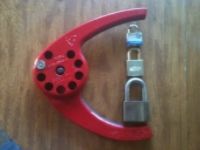
GWiens2001
- Site Admin
-
- Posts: 7608
- Joined: 3 Sep 2012 16:24
- Location: Arizona, United States
 by YALESLEVIATHAN » 16 Oct 2013 16:08 by YALESLEVIATHAN » 16 Oct 2013 16:08
Many thanks for the reply Gordon,
yeap I've got a bag of steel and brass 1A blanks, so I'll just have to keep on trying until it works smoothly. The first key that worked and still works has some 'creative' soldering and filing on bitting 3 and 4, where I couldn't decide between .282 or .269 thou. Bitting 3 ranges from .290 right down to 273. Trouble is that I'm not sure were the pin is engaging the key, hence the confusion between a 2 or a 3 cut. I think you're right, slow and methodical is the way to go. The Yale is probably 1950's and has the much rarer heavy bronze body with pivoting shackle and shrouded shoulder combination. Inside the locking hole is a sprung brass plate that engages the notch in the shackle.
If I can I'll try to figure out how to post a picture of the lock and the shackle hole. Unfortunately due to its advanced years, I suspect, (I might be wrong), it is not the rekeyable or the dismantling type like the modern 850's. The body is pinned, which is hugely tempting to punch the pins out and see what's inside, but the old chap has been around longer than I have, so I'll show it some respect and give it an easy retirement.
Thanks for all the advice, much appreciated.
cheers, Nick.
-
YALESLEVIATHAN
-
- Posts: 8
- Joined: 16 Oct 2013 6:41
 by Raymond » 16 Oct 2013 21:04 by Raymond » 16 Oct 2013 21:04
I agree with Gordon. Cut a new blank at least 10/20 thousandths higher than your sometimes-working key and carefully re-impression. Dont put too much faith in the code. Without seeing the lock I cannot say whether that is an actual code or was stamped as some company identification. My 1946 code book does not list any Yale codes beginning with 11B... Careful impressioning can produce a more perfect key than possible with a code cutter. Remember that the pins could be worn. Use a smoked blank to verify the spacing and hold it next to the impressioning blank to make sure you dont move the cuts sideways. Most of the keys of that age did not have "flats" on the bottom of each cut as a modern code machine does today. Instead they were round as made by the original cut with a round file.
Have you picked the lock so you can look in and verify the approximate depths of most of the front pins? It helps. Sounds like you are now hooked. Lock are fun.
Nothing is foolproof to a talented fool. Wisdom is not just in determining how to do something, but also includes determining whether it should be done at all.
-
Raymond
-
- Posts: 1383
- Joined: 18 Jan 2004 23:34
- Location: Far West Texas
 by GWiens2001 » 16 Oct 2013 21:30 by GWiens2001 » 16 Oct 2013 21:30
Easy way to check your pin spacing is by comparing it to the side of the lock. See the plug circles on the side? Place the shoulder of your key blank on the bottom of the lock, with the key rising alongside the lock body. Those circles are where the pins are.  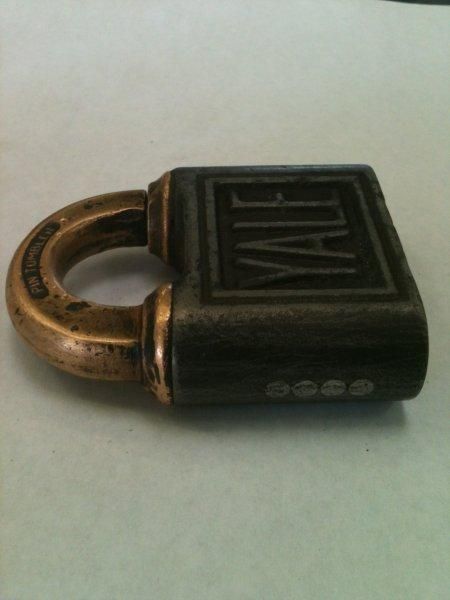 And a quick summary of disassembly: Remove this bushing as described above 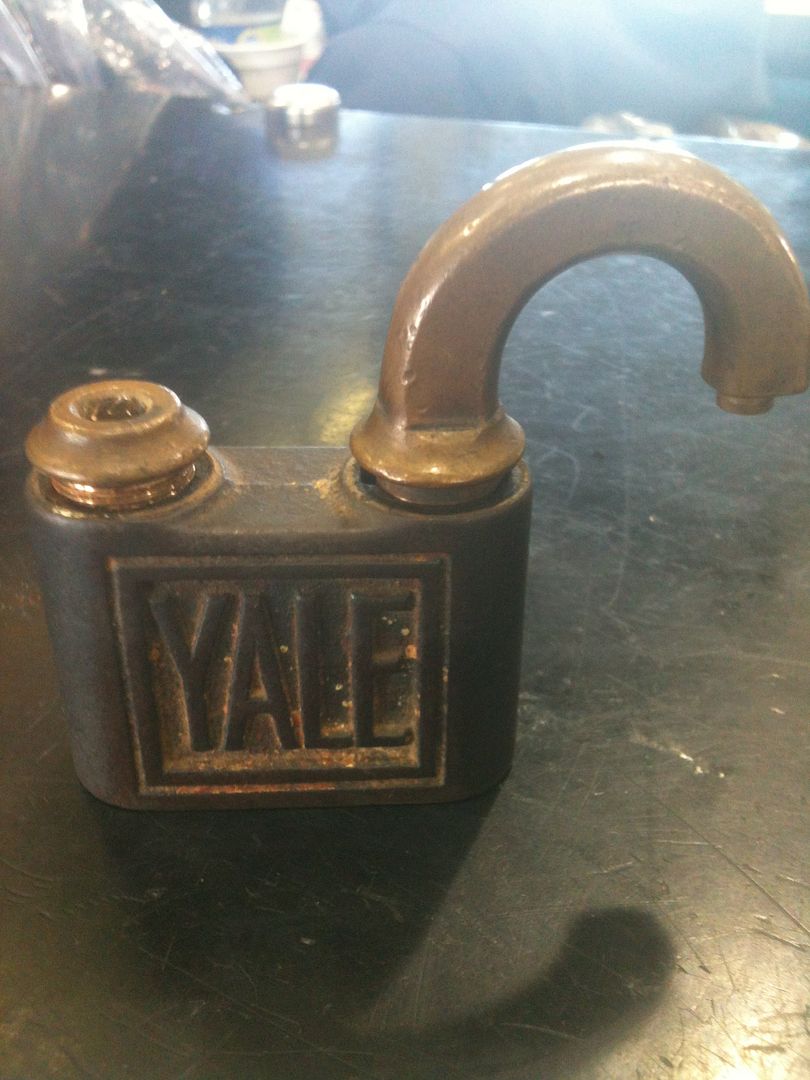 Slide the spring away from the shackle: 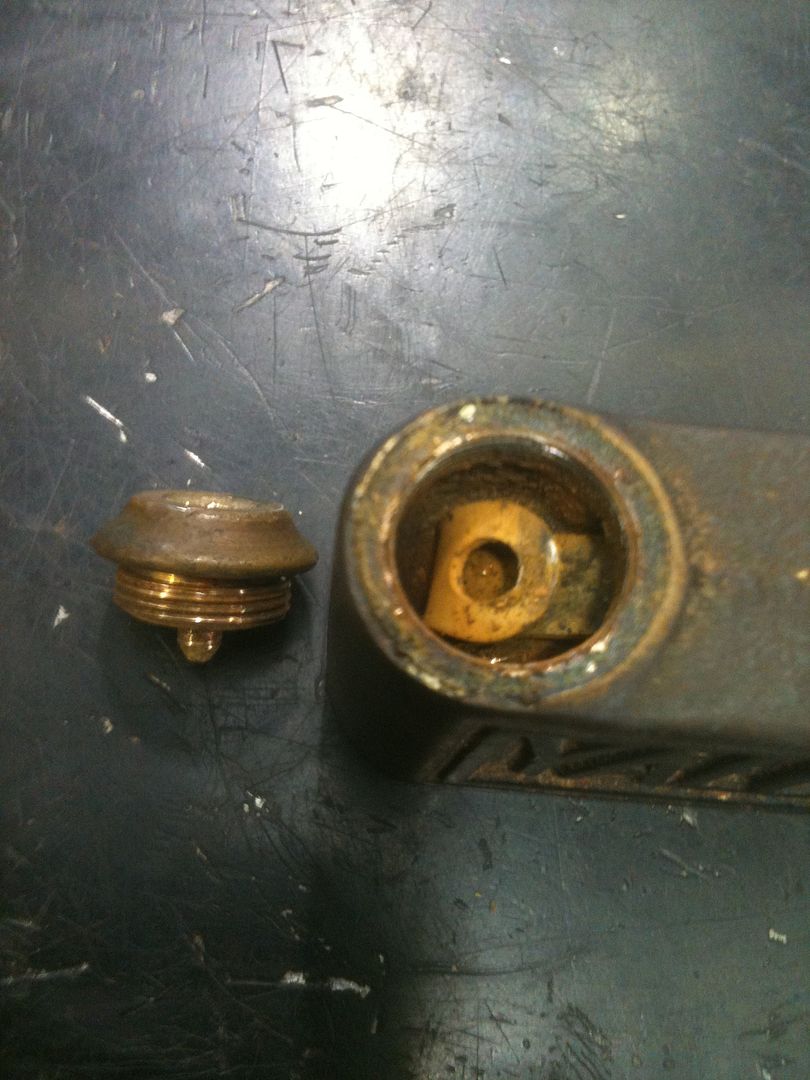 Slide out the shackle/plug. 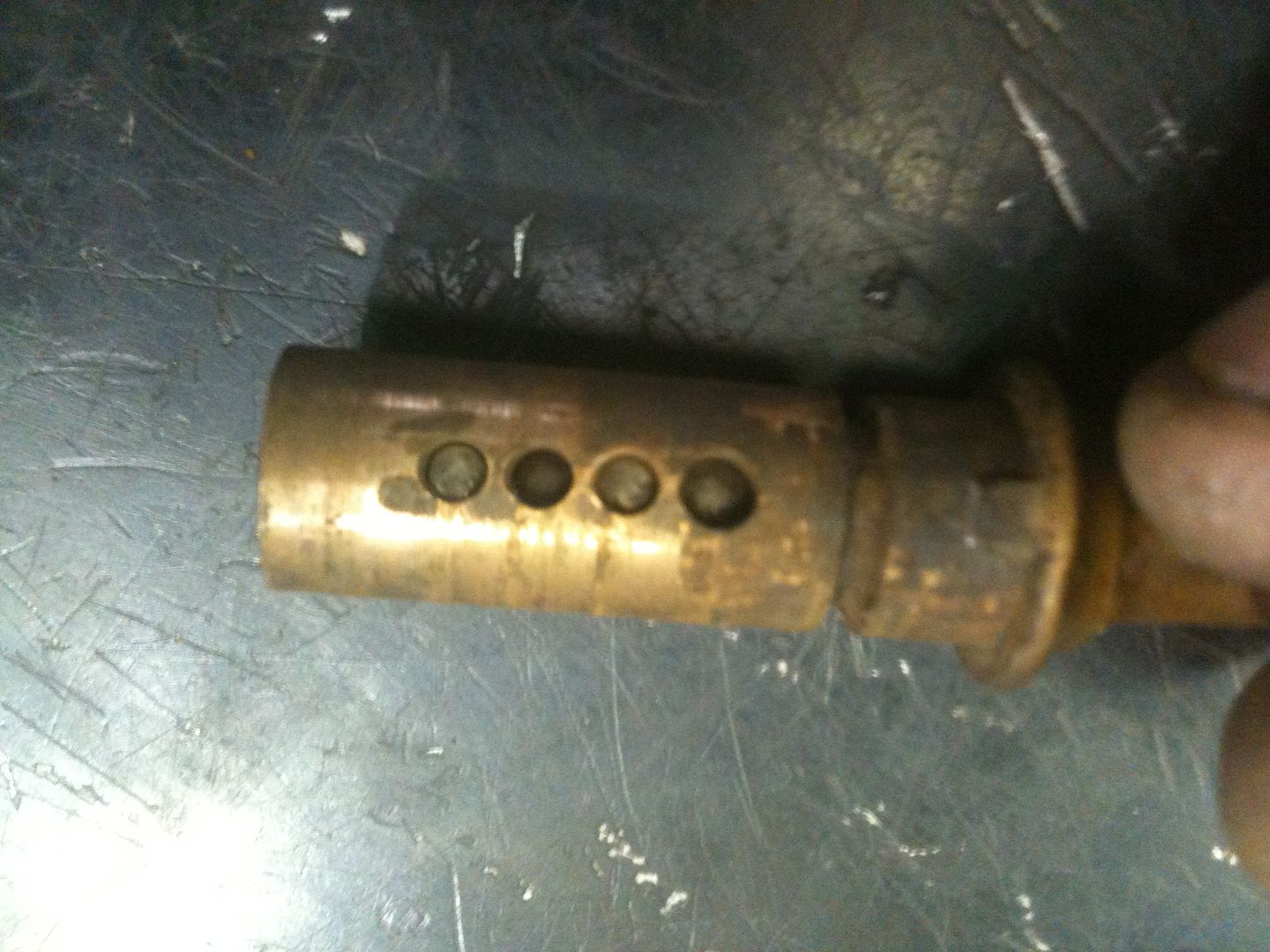 How my brain currently seems to be working: 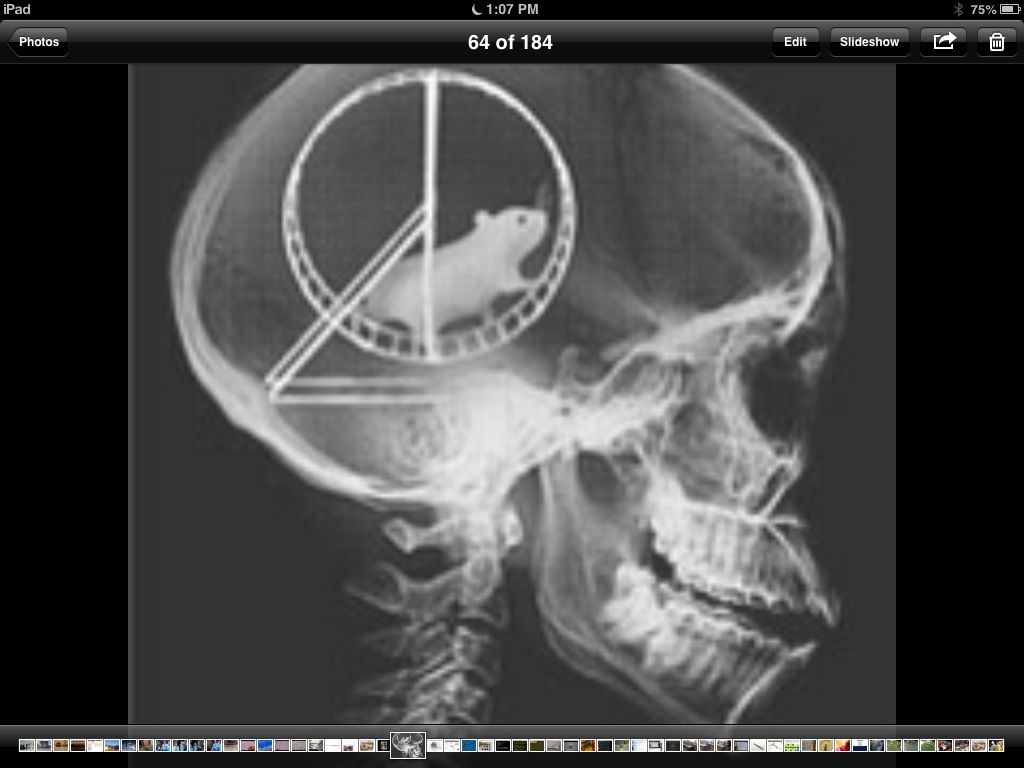 As Raymond said, the pins can be worn, and have the true bitting in between what are standard cuts for this lock. Good luck, and keep us informed.  Gordon Just when you finally think you have learned it all, that is when you learn that you don't know anything yet.
-

GWiens2001
- Site Admin
-
- Posts: 7608
- Joined: 3 Sep 2012 16:24
- Location: Arizona, United States
 by YALESLEVIATHAN » 17 Oct 2013 7:37 by YALESLEVIATHAN » 17 Oct 2013 7:37
Many thanks for all the help with this. This Yale is made in England is a 2 1/2" monster. If you have a look at an identical padlock in a youtube vid by a Uk chap with the user name waddac2 .
On the pin spacings, I'll have to smoke it on a fresh blank and hopefully then I can cross reference those position with the heights on the working key.
Thanks for the pics Gordon, unfortunately my shrouded 850 doesn't have pin plugs on the sides, so it's impressioning or guess, ha. I've taken some pictures, but idiot that I am, I can't figure out how to make them part of my post, as you've done. It is altogether a much bigger heavier lock than the one in the original post, but sadly it is the non take apart kind. Huge shame, I'd love to have a peek at the workings.
I know that I should stick to one project lock at a time, but I've just opened a fresh jiffy parcel that arrived this morning with another old English made Yale bronze padlock. Again, this one didn't have a key, but arrived open, that is until I snapped it shut. Also received three Southord reinforced hooks to replace my notched Sparrows high reach hook that snapped last week. Credit to Sparrows, they sent a free replacement out immediately, but the second one has an identical grinding notch, half way down the shaft. I figure the stresses are concentrated at the notch, which makes it snap. The level of finish on the Southord is of a higher standard, but I guess they've had longer to get their products right. Looking forward to sitting down with the new padlock to test out the new picks.
I don't have a photo hosting account, so is it possible to just copy and paste a couple of pictures to show the Yale 850?
Thanks again for all the very helpful info.
All the best, Nick.
-
YALESLEVIATHAN
-
- Posts: 8
- Joined: 16 Oct 2013 6:41
 by keysman » 17 Oct 2013 9:21 by keysman » 17 Oct 2013 9:21
YALESLEVIATHAN wrote:I don't have a photo hosting account, so is it possible to just copy and paste a couple of pictures to show the Yale 850?
Thanks again for all the very helpful info.
All the best, Nick.
upload your photos here: http://tinypic.com/Everyone who eats potatoes eventually dies. Therefore potatoes are poisonous.
-
keysman
- Moderator Emeritus
-
- Posts: 1174
- Joined: 29 Dec 2004 5:09
- Location: Las Vegas,Nv.USA
-
Return to This Old Lock
Who is online
Users browsing this forum: No registered users and 1 guest
|











